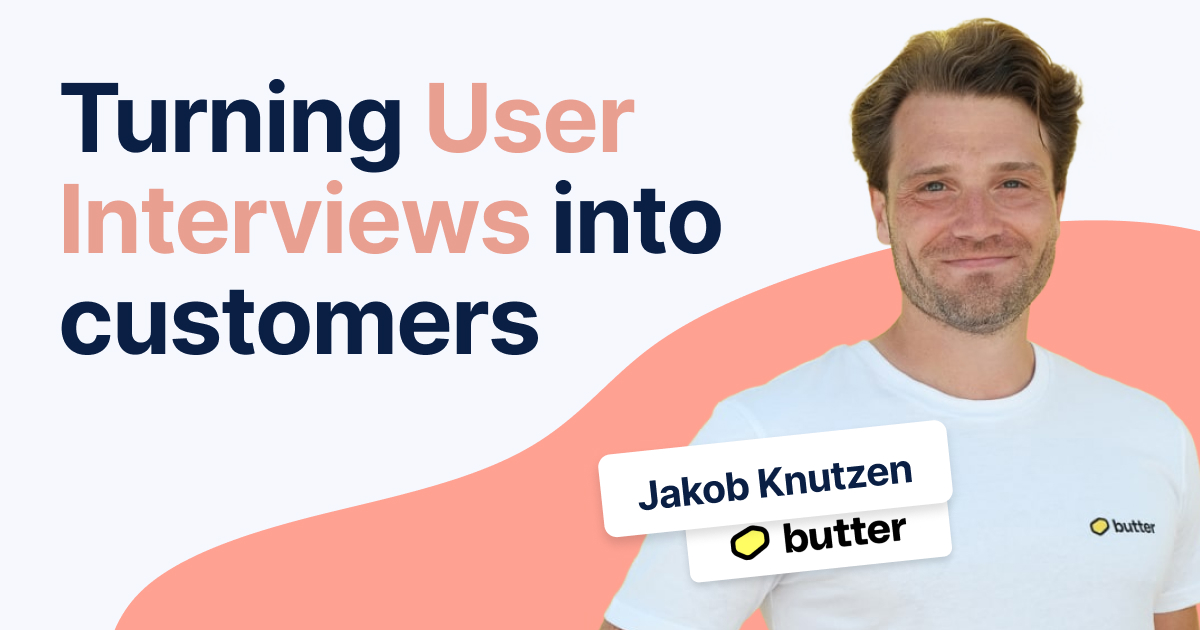Explore the fascinating journey of Butter, a game-changing platform designed for remote workshops and training. In this insightful interview, Jakob shares how his team found their purpose, smartly interviewed over 300 users early on, his approach to leadership, and a lot more. Discover the real, tangible steps behind their achievements.
What is your company doing and how did you validate this idea?
Context:
Butter is a platform similar to Zoom, but it's designed specifically for workshops and training sessions. Our journey began with three co-founders, each contributing unique expertise. We had one developer, one growth specialist (myself), and one talented product designer.
Our previous venture, a remote startup, ended in failure. Not due to a lack of effort or skill, but because we failed to identify the right problem to solve. Determined not to repeat our past mistakes,this time we decided to proactively engage with users directly.
Building Butter:
Our journey began in 2020, coinciding with the pandemic-driven shift to remote work. Drawing from our prior experience as a remote company starting in February 2020, we chose the workshop format to train startups and teams in remote work best practices.
We adopted a workshop format to train startups in remote work best practices, leveraging our own experiences. These workshops weren't just about sharing our insights; we actively listened to participants to understand their challenges and pain points.
However, we soon realised that conducting online workshops was a monumental challenge. Despite my background in strategy consulting at Bain, and my experience in building an agency with numerous workshops, online workshops proved to be a different beast. They required extensive preparation, and tools like Zoom, which we initially used, couldn't cope with the demands. These tools led to technical overload, diverting focus from people to tools. Engaging participants and facilitating learning became incredibly difficult.
Participants felt overwhelmed by the multitude of tools, making it difficult to focus on workshop content and engage effectively.
This realisation prompted us to start building Butter in June 2020, a little over three years ago. Our goal was to create a platform that simplifies online workshops, enabling facilitators and participants to concentrate on content and interaction.
Funding and adoption:
Since our inception, Butter has achieved significant milestones. We secured a pre-seed round of funding, followed by a seed round in February 2021, with support from Project A and a group of esteemed angel investors, including Des Traynor from Intercom and Johannes Schildt from Kry.
Butter is used by companies like Netflix, Webflow, Canva, and Kraft Heinz, who rely on it for their internal workshops. Additionally, many agencies have chosen our platform for client workshops.
Our journey is focused on committing to understanding user needs, addressing real problems, and empowering organisations to seamlessly conduct workshops and training sessions.
How do you identify and prioritise new growth channels?
Strong Focus:
When it comes to identifying and prioritising new growth channels, I adhere to a few core principles.
One of the key principles I follow is the 80/15/5 rule, which means that typically, one channel brings about 80% of your growth, while the others contribute smaller portions. You have to find that primary channel that's driving most of your growth.
Doubling down on your strongest channel is crucial, and you should always know what your strongest channel is. It's more about identifying your top three channels and leaning heavily into them while remaining somewhat exploratory, depending on the resources you have available for experimenting with new channels.
Growth Loops:
Now, specifically concerning Butter, our primary growth motion revolves around product-led growth. Remarkably, around 35% of the users who sign up for Butter these days have already been in a Butter session before. When we examine the sources of our users, around 95% to 97% of them come from organic sources.
Our top sources include organic search, direct traffic, and organic branded searches. Additionally, our referral programs are performing well, with a special shoutout to cello.com, our go-to-tool for referrals. Referrals play a significant role in our growth strategy.
We also put effort into organic non-branded search, essentially SEO for non-branded keywords.
Secondary channels:
Our secondary and tertiary channels that we are currently focusing on are community and content. We've established a strong user community, which acts as a community of practice. Additionally, our content strategy includes social content and blog posts, which help drive awareness and improve our SEO.
What are your top skills as a founder? How do you work on it?
Analytics and sales:
As a founder, I believe there are both hard functional skills and soft skills that are crucial in this role.
On the hard skills side, I've found that having a background in finance and a deep understanding of financial matters, particularly in terms of strategy and control, has been somewhat useful. Additionally, analytics is a skill I value highly, and I take responsibility for many of the analytics tasks within the company.
Sales is another functional skill that I consider indispensable. As a CEO, I believe that sales is perhaps the most important skill. It's not just about selling products or services but also about getting people, employees, customers, and investors on board.
Leadership:
From a soft skills perspective, I gained valuable experience when I built an agency in Indonesia where we grew to a team of 50 people before eventually selling it off. Leadership was a skill I learned during that time. Leadership is such a broad topic that it could take hours to unpack, but one of the most critical aspects, in my opinion, is creating a culture and an environment characterised by very high levels of psychological safety. This allows you to attract the best possible talent and empower them to do their best work. That's the kind of company culture and working environment that we strive for—one that makes us happy to come to work every day.
Further, one of my core beliefs as a founder is that you shouldn't just come up with principles randomly from textbooks or what you think you should have. Instead, you should take what's best about yourself and the kind of company where you'd want to work forever and use that to create your principles and values.
What is that one opportunity that had a significant impact on your company's growth or direction?
Linkedin Outreach:
One of our pivotal moments in the early days of growing Butter was reaching our first 1000 users, which was quite interesting. To achieve this, we conducted a series of interviews and LinkedIn outreach, and this approach worked incredibly well for us.
During the first six months of Butter's existence, I personally conducted between three to four hundred interviews. The primary goal was to ensure we thoroughly understood the problem we were addressing, especially considering our prior startup experience. We interviewed a wide range of individuals, including coaches, consultants, trainers, and anyone involved in online workshops.
We initiated these interviews mainly through LinkedIn outreach. Initially, we reached out to people we already knew, leveraging my previous agency experience. From there, we expanded our outreach to include cold messaging on LinkedIn to individuals with titles like coach, consultant, trainer, or agile coach. The message we sent wasn't a sales pitch but an invitation for an interview, inquiring if they faced specific challenges and if they were interested in discussing them.
Process and tools:
The fact that many people responded positively and wanted to engage in these discussions was a strong indicator that we were onto something. What made this approach even more effective was our unique hack of conducting these interviews within the Butter platform. We sent out a Butter link, and a percentage of interviewees expressed interest in the product itself, leading to questions and conversions into actual Butter users.
Regarding the volume of outreach needed, it was a substantial effort. My co-founder, Chris, who serves as the CPO, and Cheska, our Chief Growth Officer, were also heavily involved in conducting these interviews. I personally invested a significant amount of my time, at times conducting eight interviews back-to-back. As a CEO, this was a key way for me to stay deeply connected to our users and understand their problems, which ultimately makes you more effective in various aspects of the business, including sales, employee onboarding, and investor conversations.
To facilitate our LinkedIn outreach, we used Octopus CRM, which proved to be highly effective. Additionally, one of the most important books I've ever read for this process is "The Mom Test" by Rob Fitzpatrick. It emphasises not pushing your product during interviews. Instead, the focus should be on understanding the problem. In our interviews, I rarely discussed Butter itself, especially in the initial part. Toward the end, if there was interest, I would provide more details about Butter.
We documented all email addresses and maintained a tally of everyone we interviewed. Following the interviews, we reached out to these individuals, offering them the opportunity to try out what we had built or added them to our mailing list.
This entire process helped us get our first 1000 users and also get a thorough understanding about them. This has helped us build the right product and brand for our target.
What part of your business are you most proud of? Why?
Team and culture
What I'm most proud of in our business is the team and our culture. We recently had a meetup with our engineering team in Penang, Malaysia, which brought together people from Australia, Dubai, Indonesia, and Malaysia. It's worth noting that we are a fully remote team, so just seeing the dedication and the joy of people coming together from different corners of the world is incredibly rewarding.
What sets our team apart is not just their togetherness, but their resilience and determination, especially during these challenging times for most SaaS companies. Witnessing the grit and pride they have in the product we're building, and the emotional vulnerability everyone shows toward each other, is truly remarkable. It's second to none.





